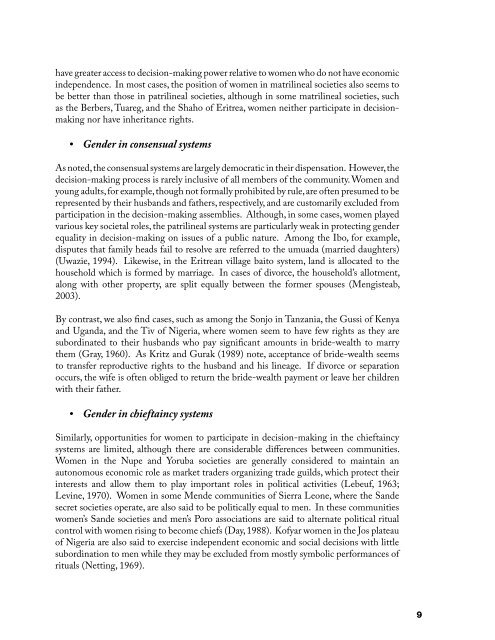Relevance of - United Nations Economic Commission for Africa
Relevance of - United Nations Economic Commission for Africa
Relevance of - United Nations Economic Commission for Africa
Create successful ePaper yourself
Turn your PDF publications into a flip-book with our unique Google optimized e-Paper software.
have greater access to decision-making power relative to women who do not have economic<br />
independence. In most cases, the position <strong>of</strong> women in matrilineal societies also seems to<br />
be better than those in patrilineal societies, although in some matrilineal societies, such<br />
as the Berbers, Tuareg, and the Shaho <strong>of</strong> Eritrea, women neither participate in decisionmaking<br />
nor have inheritance rights.<br />
• Gender in consensual systems<br />
As noted, the consensual systems are largely democratic in their dispensation. However, the<br />
decision-making process is rarely inclusive <strong>of</strong> all members <strong>of</strong> the community. Women and<br />
young adults, <strong>for</strong> example, though not <strong>for</strong>mally prohibited by rule, are <strong>of</strong>ten presumed to be<br />
represented by their husbands and fathers, respectively, and are customarily excluded from<br />
participation in the decision-making assemblies. Although, in some cases, women played<br />
various key societal roles, the patrilineal systems are particularly weak in protecting gender<br />
equality in decision-making on issues <strong>of</strong> a public nature. Among the Ibo, <strong>for</strong> example,<br />
disputes that family heads fail to resolve are referred to the umuada (married daughters)<br />
(Uwazie, 1994). Likewise, in the Eritrean village baito system, land is allocated to the<br />
household which is <strong>for</strong>med by marriage. In cases <strong>of</strong> divorce, the household’s allotment,<br />
along with other property, are split equally between the <strong>for</strong>mer spouses (Mengisteab,<br />
2003).<br />
By contrast, we also find cases, such as among the Sonjo in Tanzania, the Gussi <strong>of</strong> Kenya<br />
and Uganda, and the Tiv <strong>of</strong> Nigeria, where women seem to have few rights as they are<br />
subordinated to their husbands who pay significant amounts in bride-wealth to marry<br />
them (Gray, 1960). As Kritz and Gurak (1989) note, acceptance <strong>of</strong> bride-wealth seems<br />
to transfer reproductive rights to the husband and his lineage. If divorce or separation<br />
occurs, the wife is <strong>of</strong>ten obliged to return the bride-wealth payment or leave her children<br />
with their father.<br />
• Gender in chieftaincy systems<br />
Similarly, opportunities <strong>for</strong> women to participate in decision-making in the chieftaincy<br />
systems are limited, although there are considerable differences between communities.<br />
Women in the Nupe and Yoruba societies are generally considered to maintain an<br />
autonomous economic role as market traders organizing trade guilds, which protect their<br />
interests and allow them to play important roles in political activities (Lebeuf, 1963;<br />
Levine, 1970). Women in some Mende communities <strong>of</strong> Sierra Leone, where the Sande<br />
secret societies operate, are also said to be politically equal to men. In these communities<br />
women’s Sande societies and men’s Poro associations are said to alternate political ritual<br />
control with women rising to become chiefs (Day, 1988). K<strong>of</strong>yar women in the Jos plateau<br />
<strong>of</strong> Nigeria are also said to exercise independent economic and social decisions with little<br />
subordination to men while they may be excluded from mostly symbolic per<strong>for</strong>mances <strong>of</strong><br />
rituals (Netting, 1969).
















